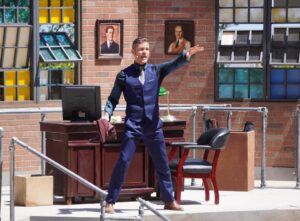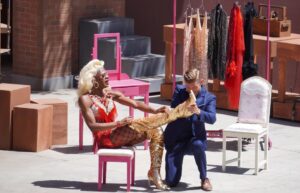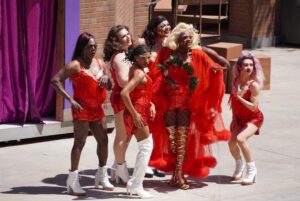Kinky Boots
Cyndi Lauper (Music & Lyrics); Harvey Fierstein (Book)
Mountain Play

Celebrating Pride Month with full glitz and gusto, Mountain Play opens its 111th season on Mount Tamalpais with Harvey Fierstein (book) and Cyndi Lauper’s (music and lyrics) Kinky Boots, the 2013 musical that took the country by storm and won thirteen Tony nominations and ultimately six awards, including Best Musical. In every production since its initial Broadway bow, Kinky Boots has wowed audiences with its kaleidoscope of glittery color in costumes, wigs, and make-up as well as gloriously decorated, leather-covered legs in high-heeled boots that march, kick, and often fly skyward.
With two outstanding lead performers; a large cast representing a full range of shape, size, race, gender, and sexual orientation; and an array of eye-popping costumes that glitter and glisten (Amie Schow, designer extraordinaire), the Mountain Play overall continues that Kinky Boots tradition even as it suffers from some ongoing, nagging issues. The latest, annual production does its best to thrill and thrive on the vast stage but sometimes has difficulty fully projecting in the great outdoors the musical’s famous, electric excitement in its big, act-ending numbers and has particular problems (at least on opening day) to overcome repeated and sometimes serious sound system issues.
Based on true events, Kinky Boots recounts how in Northampton, England, Charlie Price avoids closing an inherited shoe factory whose business is failing and thus leading to laying off all its long-time workers whom he has known since birth. He saves the plant and the jobs by turning the production line from one making men’s very traditional, dress shoes to one making drag queens’ gaudy but gorgeous boots.
The journey to the musical’s triumphant, “Raise You Up/Just Be” finale begins with a chance meeting between twenty-something Charlie and a London drag performer named Lola – ‘chance’ meaning Lola knocks Charlie out with her boot as she defends herself against taunting hooligans while he is trying to help save what he thought was a six-foot-tall, helpless damsel. Lola’s heel is busted in the process (as is Charlie’s head and pride), leading eventually to a partnership between the two when Charlie realizes there is a niche market no one else is satisfying – feminine boots strong enough and elegantly wild enough for the world of cross-dressing men. As Lola tells him, “I’d give my tit for a shoe that could stand up to me.”
The road toward the story’s emotion-high ending is one full of potholes – obstacles like workers who want nothing to do with ‘poofs’ and sidetracks like Charlie’s London-bound fiancé, Nicola, who wants nothing to do with Northampton and certainly not with a dying shoe factory. And then there is Charlie himself, who is carrying unresolved, inner pressures to live up to his now-deceased dad’s expectations and who has jumped in over his head to get a never-produced product ready in three weeks for the premiere, European shoe show in Milan, Italy.

Charlie rides a big, emotional rollercoaster as he faces doubts about his competencies to lead and to love. When Cody Craven sings “Soliloquy,” his words convey in clearly intoned notes the initial, soul-searching doubts that Charlie as the new boss is feeling: “Do I belong here? Am I a fraud? Am I what’s wrong here?” But as he picks up a piece of leather and begins to punch some holes to make a shoe, his Charlie discovers a new confidence in a full, vibrant, fantastically accented “Step One,” singing in the rock-star style Lauper’s music demands, “I used to be a zero but now I clearly feel that I may be the hero who reinvents the heel.” Charlie’s decision to transform his conservative, family business into a drag queen’s dream is given genuine, emotional anchoring as Cody Craven beautifully sings, “It’s not just a factory … This is my family.”
But Charlie still must conquer a host of issues with his own impulsive, high-demanding management standards that are not working so well with a group of workers still loyal to the gentler style of the man Charlie himself holds in stellar regard, his father (played by the melodically talented Sean O’Brien). Cody Craven continues to command the stage in each solo appearance such as when he sings heart-rendered, gorgeously sustained notes in “Soul of a Man,” expressing Charlie’s hard look in the mirror as he reevaluates his management approach. Whether embodying these moments of near-defeating self-doubt or the eventual heights of an unlikely, glittery triumph in six-inch, red heels, Cody Craven is a Charlie Price who more than fits the shoe as designed by Fierstein and Lauper.

Fabulous with a capital “F” and written in sparkling red lipstick is Miss Jaye as Lola (aka Simon when occasionally not in drag). Has there ever been a Lola that has such a stage-stealing, drag queen walk strutted to such hip-popping, arm-flailing, and finger-snapping perfection as Miss Jaye’s Lola. With entrances and exits that are never anywhere near subtle or silent, this Lola can screech, scream, and say “AHHHHHH” in who knows how many octave ranges in order to bring both sidesplitting hilarity and full-fledged honor to her role as a drag star.
But more than just kicks reaching higher than her head or a body that shakes and shimmies from head to toe, this Lola is actually most impressive when she transforms for a few moments into her quieter, Simon side. Dressed in men’s clothing and singing in an incredibly expressive, reflective voice of falsetto softness, “Not My Father’s Son,” Lola tells in a song how her young Simon did not size up to what his father expected of a boy. Building ever increasingly volume and intensity, Simon/Lola climatically declares, “I found a way to turn it around, to see that I could just be me.” Later, in full white gown with pink boa draping to the floor, Lola sings a resounding, prayerful plea to a father now in a nursing home who will still not recognize the son he has, “Hold Me in Your Heart.” From the depths of her being, Lola sings with soulful clarity a message so many other parents and politicians today also need to hear: “Hold me in your heart just the way I am.”

Decked out always in the tightest, skimpiest, sexiest of leather, lace, see-through netting, and anything that sparkles, six Angels (Nehemiah Kirkley Aldrich, Caco, Omunique, Jon Gary Harris, Izaak Heath, and Jamari McGee) strut and sizzle their proud naughtiness to the stage to join Lola in song and dance. Their erotic-filled moves and their snarky attitudes make them a crowd favorite. Where they fail to impress quite as much is in their too-oft uncoordinated dancing and their singing as a back-up ensemble to Lola with their six voices often not able to sing loud enough to balance her one.
A number of other roles make their marks of distinction, both in humorous and heart-warming ways, as this inspiring story unfolds. As George, the friendly and peace-keeping factory manager, Gregory Lynch is delightful, especially as George continually sides with the women of Price and Son who find Lola and the Angels often to be more to their liking than their chauvinistic, homophobic (at least initially) male colleagues. His joining as a partner in song and dance with Lola and the factory’s females in “What a Woman Wants” is a fun and funny give-away as to George’s own, still-hidden (but maybe not that secretive) orientation.
Taking the smallest of roles and making it a starring one is Anna Joham as factory worker Pat whose reluctant exit in Act One’s ending is one of the show’s best moments. The burly, brooding, and often bullying Don (David Schiller) spits and snarls at Lola and the Angels before slowly transforming into a supportive friend who proudly sings in “Just Be,” “You change the world when you change your mind.”
Libby Oberlin is the highly skeptical and critical Trish who with smart-assed smirks sides with the anti-drag-queen men but finally has her own ah-ha transformation for the better. Gillian Eichenberger plays Charlie’s finance, Nicola, with the kind snobbish superiority that soon dooms her societal desires for a man who has discovered the folks and ways of Northampton are more to his liking than her more-preferred London.
Imri M. Tate performs an upside-down flip on the factory’s banister as her Lauren sings with comical antics “The History of Wrong Guys;” unfortunately, miking issues diminished greatly the selling of her song. Her Lauren more or less fades into the background the rest of the show in terms of effect and notice even though she is part of numerous scenes. Though she gets her man (i.e., Charlie) in the end, for anyone unfamiliar with the story, that has to be a huge surprise since both director and actor fail to provide much if any indication on Charlie’s part that he is the least bit attracted to her.
Andrea Bechert has designed an impressive, two-level stage setting to convey the upstairs office and the below factory floor of brick-walled Price and Son. However, missing on the immense, outdoor stage is the sense of factory intensity and hustle-and-bustle that I have seen in other, indoor theatrical productions. Likewise, both the Act One, full-cast-in-the-factory “Everybody Say Yeah” and the Milan runway “Raise You Up” showcase of high-kick boots lose the pizzazz and electricity in the great outdoors that is easier to manufacture in internal stage settings. Along with the setting’s issues, the choreography designed by the play’s director, Gary Stanford, Jr., is for the most part fairly standard and unimaginative while the singing of the Ensemble is too often unbalanced among the parts sung and fails to fill the arena.
Sound system issues that cropped up time and again during the opening afternoon’s two acts compounded in severity to silence important spoken and sung lines by Charlie and overall to mute and muddle until the last few chords the stage-filling ensemble in the climatic final two numbers. Hopefully in the final three matinees, these production issues will be corrected.
Rating: 3 E
Kinky Boots continues 2 p.m. June 8, 9, and 16, 2024, in a two-hour, thirty minute production (with intermission) in production by The Mountain Play at the Cushing Memorial Amphitheatre in Mount Tamalpais State Park, Marin County, California. Information concerning the journey to and from the site as well as tickets is available online at https://www.mountainplay.org.
Photo Credits: Clara Franco
